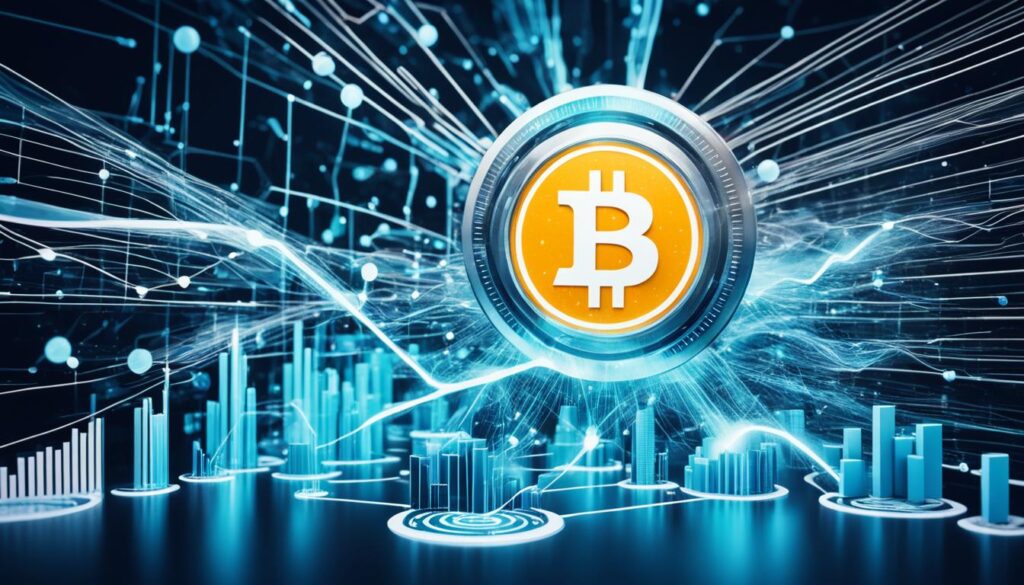Did you know that the tokenization of real-world assets has reached a market value of over $2 trillion? This innovative transformation of physical assets into digital tokens on a blockchain has opened up exciting opportunities for investors and revolutionized the way we perceive asset ownership and investment.
Key Takeaways:
- AI-powered algorithms can enhance asset valuation and risk management in tokenized markets.
- Streamlined asset digitization and compliance through AI-driven solutions improve efficiency and security.
- RWA tokenization platforms democratize access to investment opportunities by lowering entry barriers.
- Machine learning algorithms optimize asset allocation strategies, contributing to wealth creation.
- AI and blockchain technology are revolutionizing the financial industry, unlocking new levels of efficiency and accessibility.
Enhanced Asset Valuation and Risk Management
AI-powered algorithms have revolutionized the way we analyze and evaluate assets. When applied to the tokenization of real-world assets (RWA), AI-driven technologies offer enhanced asset valuation and risk management capabilities, driving efficiency and instilling confidence in tokenized markets.
Through the utilization of AI-powered algorithms, RWA tokenization platforms can analyze vast datasets and extract valuable insights. This allows for a more accurate and dynamic pricing mechanism, reducing valuation uncertainties and promoting enhanced investor confidence. By processing diverse data sources such as market trends, asset performance history, and economic indicators, AI algorithms can significantly improve asset valuation in tokenized markets.
Furthermore, AI-driven risk management tools play a crucial role in mitigating potential risks associated with tokenized assets in real-time. These tools utilize advanced algorithms to assess risks, identify anomalies, and provide proactive risk mitigation strategies. By continuously monitoring market conditions and evaluating potential threats, AI-powered risk management systems promote trust and stability within RWA token markets.
Benefits of Enhanced Asset Valuation and Risk Management:
- Improved asset valuation accuracy and transparency
- Dynamic pricing mechanisms based on real-time market insights
- Reduced valuation uncertainties, leading to enhanced investor confidence
- Proactive risk assessment and mitigation strategies
- Enhanced trust and stability within RWA token markets
Streamlined Asset Digitization and Compliance
Tokenizing real-world assets involves complex legal and regulatory requirements. AI-powered solutions can streamline this process by automating compliance procedures and ensuring adherence to relevant laws and standards.
Natural Language Processing (NLP) algorithms enable efficient parsing and interpretation of legal documents, while smart contract frameworks facilitate the execution of regulatory obligations encoded on the blockchain. AI-driven identity verification systems enhance the security and integrity of RWA tokenization platforms by accurately verifying the identities of participants and preventing fraudulent activities.
These systems automate KYC (Know Your Customer) and AML (Anti-Money Laundering) procedures, enabling seamless onboarding of investors while maintaining compliance.
Benefits of Streamlined Asset Digitization and Compliance:
- Automated compliance procedures.
- Adherence to relevant laws and standards.
- Efficient parsing and interpretation of legal documents.
- Execution of regulatory obligations encoded on the blockchain.
- Enhanced security and integrity of RWA tokenization platforms.
- Accurate verification of participant identities.
- Prevention of fraudulent activities.
- Seamless onboarding of investors.
- Maintenance of compliance through automated KYC and AML procedures.

Democratized Access to Investment Opportunities
RWA tokenization empowered by AI opens up a world of financial possibilities to a wider audience. Previously, illiquid markets are now accessible to investors through tokenization platforms that offer democratized access to investment opportunities in real estate, fine art, and private equity.
By fractionalizing ownership and lowering entry barriers, RWA tokenization allows individuals with smaller budgets to participate in traditionally exclusive markets. This inclusivity promotes financial diversity and empowers individuals to build diversified portfolios with varied asset classes.
AI-driven recommendation engines play a crucial role in this democratization process. These engines personalize investment offerings based on investors’ preferences, risk profiles, and financial goals. By tailoring investment options, investors can make informed decisions that align with their specific needs, increasing their chances of success in the market.
Furthermore, machine learning algorithms are deployed to analyze transaction patterns and investor behavior. These algorithms optimize asset allocation strategies and maximize returns, helping investors create wealth and achieve their financial objectives. By harnessing the power of AI, individuals can navigate the complex landscape of investment opportunities with confidence and efficiency.

The Potential of Democratized Access
This democratized access to investment opportunities has profound implications for financial inclusion and economic growth. It allows individuals from diverse backgrounds to participate and benefit from the wealth creation potential of tokenized markets. By breaking down barriers and embracing a broader investor base, RWA tokenization drives innovation and enables economic empowerment.
“Democratized access to investment opportunities empowers individuals to make their own financial decisions and actively participate in wealth creation.”
| Benefits of Democratized Access to Investment Opportunities | Outcomes |
|---|---|
| 1. Increased financial inclusion | Accessible investment options for individuals with limited resources, leveling the playing field. |
| 2. Diversified portfolios | Opportunity to invest in various asset classes, reducing risk and maximizing potential returns. |
| 3. Empowered decision-making | Personalized investment offerings and data-driven insights enable informed decision-making. |
| 4. Wealth creation | Optimized asset allocation strategies and potential for higher returns contribute to the creation of wealth. |
Conclusion
The synergy between Machine Learning (ML) and blockchain technology is revolutionizing the landscape of asset tokenization, particularly within the realm of real-world assets. By harnessing the power of ML, tokenized predictive markets are poised to unlock new levels of efficiency, transparency, and accessibility, transforming the way we perceive, trade, and invest in tangible assets. These cutting-edge technologies have immense potential to drive innovation and disruption in the financial industry, ushering in a new era of digitized assets and decentralized finance.
ML-powered algorithms enable enhanced asset valuation and risk management in tokenized markets. By analyzing vast datasets and extracting valuable insights, ML facilitates more accurate asset pricing mechanisms, reducing uncertainties and boosting investor confidence. Moreover, ML-driven risk management tools offer real-time assessment and mitigation of potential risks, fostering trust and stability within tokenized markets.
Streamlining asset digitization and compliance is another significant benefit of ML in tokenized markets. ML-powered solutions automate complex compliance procedures, ensuring adherence to legal and regulatory requirements. Smart contract frameworks and Natural Language Processing (NLP) algorithms enable efficient parsing and interpretation of legal documents, while identity verification systems powered by ML enhance security and prevent fraudulent activities.
Furthermore, the democratization of investment opportunities is a key advantage offered by ML in tokenized markets. Through fractional ownership and lower entry barriers, tokenization platforms enable a wider range of investors to participate in previously illiquid markets. ML-driven recommendation engines personalize investment offerings, empowering investors to make more informed decisions and diversify their portfolios. Additionally, machine learning algorithms analyze transaction patterns and investor behavior to optimize asset allocation strategies, ultimately contributing to wealth creation and financial inclusion.

Leave a Reply